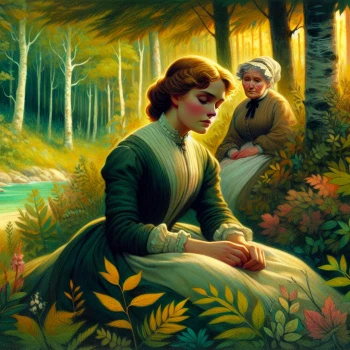
Lucy Maud Montgomery
Lucy Maud Montgomery was a Canadian author renowned for her insightful portrayals of rural life and gentle critique of social conventions, emphasizing emotional honesty and individual integrity.
Notable Works
Lucy Maud Montgomery is warmly celebrated for her timeless coming-of-age novel "Anne of Green Gables," a beloved classic that has captured the hearts of readers for generations. Set in the picturesque landscapes of Prince Edward Island, this novel skillfully blends elements of children's literature and historical fiction, vividly showcasing Montgomery's talent for creating memorable, relatable characters. Her spirited protagonist, Anne Shirley, an imaginative and fiery orphan, has become one of literature's most cherished heroines, embodying themes of belonging, identity, and the power of imagination.
Another noteworthy work, "Emily of New Moon," similarly explores themes of self-discovery and artistic ambition, gracefully navigating the inner life and creative struggles of its young heroine, Emily Starr. Montgomery's novels often highlight the beauty and resilience of friendship, community, and personal growth, resonating deeply with readers of all ages and ensuring her enduring legacy as one of Canada's most treasured literary figures.
Books by Lucy Maud Montgomery
Overview & Analysis
Lucy Maud Montgomery was a celebrated Canadian author whose literary contributions vividly captured the intricacies of rural life and individual moral growth. Writing primarily in the early twentieth century, Montgomery distinguished herself through her gentle yet incisive critique of rigid social conventions and restrictive gender roles. Her characters, often situated in idyllic rural settings, navigate complex emotional landscapes, emphasizing themes such as personal integrity, loyalty, emotional honesty, and the transformative power of individual moral judgment over societal conformity. Her narrative voice, characterized by a warm, humorous, and subtly satirical tone, resonated deeply with readers, offering both comfort and thoughtful social commentary. Montgomery's renowned novel, "The Blue Castle," exemplifies her literary approach, championing authenticity and self-acceptance against restrictive social expectations. Her works remain influential, continuing to inspire readers through their emphasis on personal authenticity, emotional sincerity, and the quiet rebellion against oppressive societal norms.
Back to TopInfluences & Worldview
Lucy Maud Montgomery's worldview is characterized by a gentle yet insightful critique of social norms and rigid class structures, deeply rooted in her profound belief in individual moral evolution. Her narratives often emphasize the transformative power of personal integrity and loyalty, underscoring her conviction that individual moral judgment should prevail over societal conformity. Writing predominantly in the early twentieth century, Montgomery subtly challenged traditional expectations, particularly those related to gender roles and societal conventions, advocating instead for emotional honesty and sincerity. While her settings often reflected rural simplicity and community warmth, her literary voice was quietly rebellious, using humor and satire as gentle yet pointed tools for social commentary. Montgomery's philosophy was marked by pacifism and a thoughtful Christian outlook, advocating for harmonious living and personal authenticity in the face of societal pressures.
Relevant Historical Events
- The Victorian Era (1837 – 1901): The Victorian era was a period of significant change in the United Kingdom, marked by industrial, cultural, political, scientific, and military change within the United Kingdom, and was marked by a great expansion of the British Empire.
- Canadian Women's Suffrage Movement (1870 – 1918): A national movement in Canada advocating for women's voting rights, culminating in women gaining federal voting rights in 1918.
- Women's Suffrage Movement (UK) (1903 – 1928): A movement advocating for women's right to vote in the UK. It was a challenging fight against societal norms and political institutions, but it ultimately led to the Representation of the People Act 1928, granting all women over 21 the right to vote.
Notable Characters
Lucy Maud Montgomery is best known for creating characters who are spirited, imaginative, and resilient individuals, often challenging societal expectations and overcoming personal adversity. One of her most memorable creations is Anne Shirley from "Anne of Green Gables," whose vibrant imagination, emotional depth, and unwavering optimism exemplify Montgomery's affection for characters who possess strength of character and a deep connection to their surroundings. Similarly, Valancy Stirling from "The Blue Castle" embodies independence and courage, transforming from a timid woman dominated by family expectations into someone who fearlessly seeks personal happiness and fulfillment. Montgomery's characters often navigate the tension between individual desires and restrictive societal norms, highlighting the struggles and triumphs of women in the early 20th century. These characters reflect Montgomery's worldview, which emphasizes personal authenticity, emotional sensitivity, and the transformative power of nature and community, shaped by the conservative yet changing landscape of her era. Through such richly drawn individuals, Montgomery explores timeless themes of identity, belonging, and the enduring pursuit of happiness in the face of societal limitations.
Back to TopThemes of Focus
Lucy Maud Montgomery's literary work consistently explores themes of self-discovery, individualism, and the transformative power of imagination. Her characters frequently navigate restrictive social conventions, ultimately finding personal freedom through inner strength and creative expression. Montgomery emphasizes the importance of authenticity and individual happiness, often critiquing societal expectations, particularly regarding women's roles and agency.
Secondary themes, such as nature's influence on human emotion and the tension between societal duty and personal fulfillment, reinforce her primary concerns. Montgomery's vivid depictions of natural landscapes often parallel her protagonists' emotional journeys, symbolizing liberation, renewal, and spiritual growth. These themes reflect both the author's progressive worldview and the changing cultural dynamics of her time, highlighting a subtle yet persistent challenge to early 20th-century social norms and gender roles.
Back to TopLegacy & Impact
Lucy Maud Montgomery's literary legacy endures prominently through her nuanced exploration of individualism, emotional sincerity, and gentle critiques of societal expectations. Her works, most notably "Anne of Green Gables," have significantly influenced literature by introducing spirited, introspective characters who challenge traditional gender roles and champion personal authenticity. Montgomery's stories have inspired generations, resonating deeply with readers navigating their own paths toward self-discovery and moral independence.
Her emphasis on emotional honesty, personal integrity, and loyalty remains profoundly relevant today, prompting ongoing discussions in educational curricula, scholarly analyses, and literary adaptations worldwide. Montgomery's narratives have transcended their initial rural Canadian settings to attain global recognition, continuously adapted into stage productions, film, television, and contemporary reimaginings that highlight her timeless themes.
While generally celebrated, Montgomery's legacy has faced critical reassessments that explore the complexities of her personal life, mental health struggles, and the societal pressures she subtly critiqued. These nuanced discussions have enriched her legacy, presenting her as a multidimensional figure whose gentle yet incisive critiques of class structures, gender norms, and social conformity continue to resonate profoundly in modern discourse.
Back to TopConclusion
Lucy Maud Montgomery's stories continue to resonate deeply with contemporary audiences, echoing timeless themes of personal growth, sincerity, and gentle resistance to societal constraints. Her thoughtful exploration of individual moral journeys and emotional honesty has indelibly shaped literary traditions, inspiring subsequent generations of writers to embrace authenticity and challenge rigid norms through nuanced storytelling.
By delicately weaving humor and warmth into her narratives, Montgomery invites readers not only to reflect on their own values but also to question societal expectations with compassion and insight. Today's readers will find enduring relevance in her work, discovering encouragement to pursue self-awareness, integrity, and personal growth. Montgomery's gentle yet profound voice remains a guiding force, reminding us of literature's power to illuminate our shared humanity and inspire meaningful reflection.
Back to Top